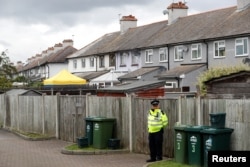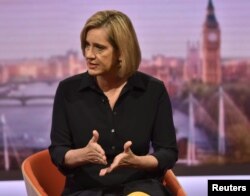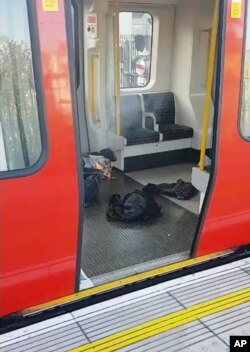Britain eased its terrorist threat level Sunday from "critical" to "severe" after police arrested a second suspect in the bombing of a subway train in London.
Home Secretary Amber Rudd said the second arrest was an indication that "good progress" was being made int the investigation of Friday's attack that injured 30 people, all but one of whom have now been released from hospitals.
The "severe" threat level indicates British authorities now believe another attack is highly likely, while the "critical" designation meant an attack was seen as imminent.
Police said in they arrested a 21-year-old man in the west London suburb of Hounslow, which is home to London's Heathrow Airport, just before midnight Saturday. He was arrested under Britain's Terrorism Act.
Authorities searched a home in the London suburb of Stanwell, also neighboring Heathrow Airport, that was linked to the second suspect, who was not identified.
Earlier Saturday, an 18-year-old man was arrested in the port area of Dover, a major ferry terminal for travel between Britain and France.
"He was arrested on the suspicion of being concerned in the commission, preparation or instigation of acts of terrorism," Deputy Assistant Police Commissioner Neil Basu said at a Saturday news conference.
WATCH: Scotland Yard Official: 212 Witnesses to Attack Identified
Basu said the first arrest was "significant." Following that arrest, police evacuated the Dover port and a suburban London neighborhood as they searched a nearby house.
Residents of the neighborhood say the house that was searched is occupied by an elderly couple — Penelope and Ronald Jones — who have taken care of foster children for decades. Queen Elizabeth honored them for their efforts in 2010.
Basu said a "number of items" were recovered from the Dover terminal, without giving further details.
Basu also said investigators were keeping an "open mind" as to whether more than one person was involved in the attack.
"We are still pursuing numerous lines of inquiry, and at a great pace," Basu said. "Our priorities... are to identify and locate any other suspects," he added.
Islamic State jihadists claimed responsibility for the attack, but Home Secretary Rudd discounted it.
"It is inevitable that so-called Islamic State or Daesh will try to claim responsibility, but we have no evidence to suggest that yet," she told the BBC. Rudd said authorities will try to determine how the suspects may have been radicalized.
Earlier, she had dismissed as "pure speculation" U.S. President Donald Trump's claim, made Friday on Twitter, that a "loser terrorist" behind the attack was known to Scotland Yard.
British Prime Minister Theresa May had already rebuked the U.S. leader for the remark, saying, "I never think it's helpful for anybody to speculate on what is an ongoing investigation."
London Transport authorities said Saturday they have re-opened the Parsons Green station where the bomb on a train partially detonated.
Images of the bomb posted on social media appear to show a bucket on fire that had been placed inside a plastic bag close to a rail car door.
May said the public may see more armed police on the streets and the transport network. The prime minister also said members of the military will begin aiding police, providing security at some sites not accessible to the public.
The blast was the fifth major terrorist attack in Britain this year.
London police said their investigation into Friday's attack is being supported by MI-5, Britain's domestic intelligence agency.
London Mayor Sadiq Khan said the British capital "will never be intimidated or defeated by terrorism."










